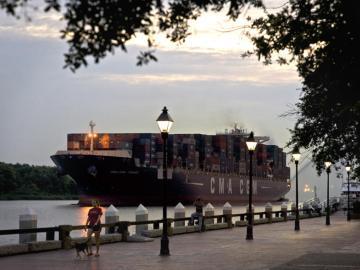
Section Branding
Header Content
Nationwide, Ports Wait For Funding
Primary Content

Ports from New York to Florida are scrambling for federal money to prepare for super-sized ships.
States say, the funding is critical to grow the economy.
But with federal spending tight, not all ports will get the money.
Savannah is the nation's fourth-busiest container port.
It ships out 12% of the nation's exports from a bustling dock that swirls with trucks, cranes and huge ships.
Georgia Ports Authority Executive Director Curtis Foltz says, when a Panama Canal expansion project is finished in a few years, even bigger ships will be calling on Savannah.
"The new locks will allow container vessels of three-times the size that can currently transit the lock system," Foltz says.
Foltz says, it's critical Georgia get six-hundred-million federal dollars to deepen the Savannah harbor to serve the big ships.
Governor Nathan Deal says, the Savannah project would benefit the whole nation.
"We believe that this is a project that has significance not just for this area of the state or the state itself, but for the entire Southeast and the entire eastern side of the United States," Deal says.
And according to the US Army Corp of Engineers, Deal's right.
The Corp spent 14 years studying Savannah harbor deepeening and concluded, the project will earn back its cost to federal taxpayers four-to-one by making shipping more efficient.
But other US ports -- at least ten all together -- want to expand for the big ships, too.
At some point, Panama Canal Executive Director Roberto Aleman says, the US will have to decide which port expansions get funded.
"There are going to be some more efficient ports than others," Aleman says. "And there are going to be investments that are going to have to be repaid. Eventually, you have to make decisions as to which ports are going to get the money."
Aleman says, the largest ships likely will stop at two or three ports, not ten.
And not even Kurt Nagle, head of the American Association of Port Authorities, believes federal taxpayers can afford all the projects.
"Certainly we as an association and in the industry as a whole recognize and believe that not every port in the country needs to be at a depth to be able to accommodate the largest vessels in international trade," Nagel says.
The US Department of Transportation has started to look at which port-related rail and road projects would perform best on a national basis.
But for deep water, Corp of Engineers navigation branch chief Jim Walker says, there is no national strategy for determining which port expansions would earn the best return for federal taxpayers.
"The Corp of Engineers studies the projects as authorized by Congress," Walker says. "In terms of laying out a master plan, that's just not the current process."
Congress authorizes cost-benefit studies and allocates money for the projects on a port-by-port basis.
Right now, Republican Georgia is still waiting on the Democratic White House and a split Congress to act.
"It's the nature of pork-barrel politics," says Dave Kyler of the Center for a Sustainable Coast.
Kyler and other harbor deepening critics say, lawmakers should fund the projects only after a national review.
Nagel of the Port Authorities Association says, he'd like a national look at the entire shipping network.
If recent trends in Congress hold, Kyler says, that might be where dollars go.
"Now due to circumstances, the politics are aligning in a way that is going to force Congress into making more rational decisions because of limited funding," Kyler says.
Georgia officials insist Savannah harbor deepening isn't pork and can't wait on more study.
They point to the project's annual estimated benefit to taxpayers of more than $100 million, as determined by the Corp.
Savannah harbor deepening is still under the Corps' review.
Their final decision isn't expected until next year.
Georgia, however, wants the funding ASAP.
Tags: Georgia Ports Authority, Curtis Foltz, Savannah Harbor, corp of engineers, GPB News, harbor deepening, pork barrel earmarks, federal spending, Georgia ports, Dave Kyler, Center for a Sustainable Coast, Governor Nathan Deal, Gov. Nathan Deal, Savannah Harbor deepening, Jim Walker, National Association of Ports Authorities, Kurt Nagel
